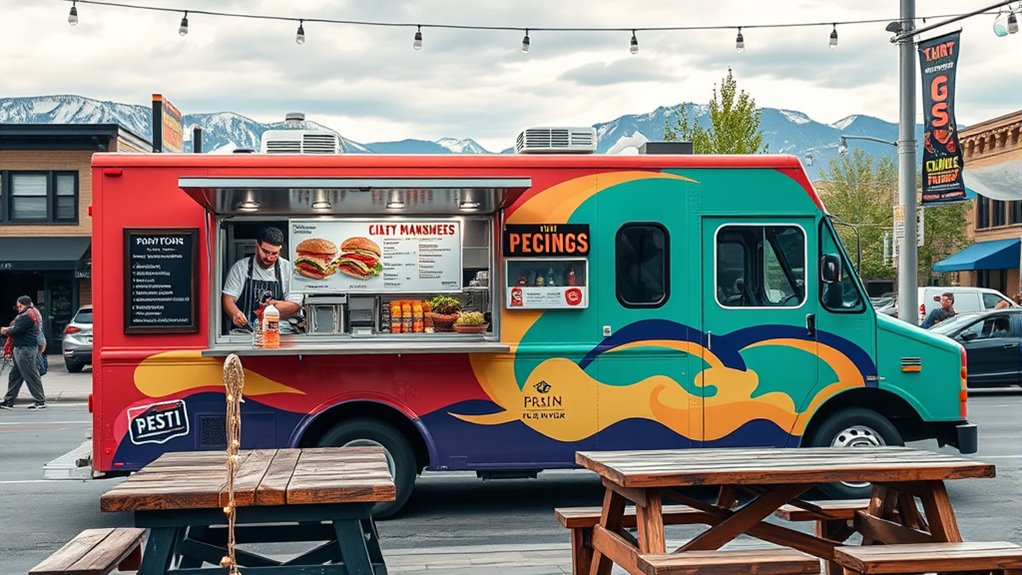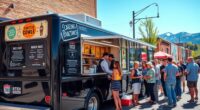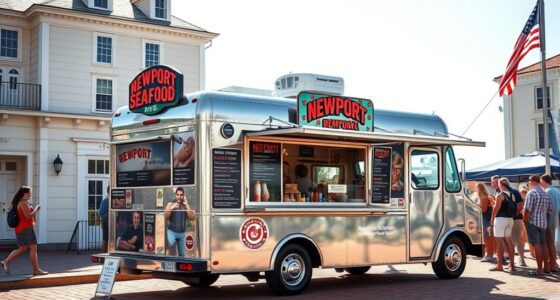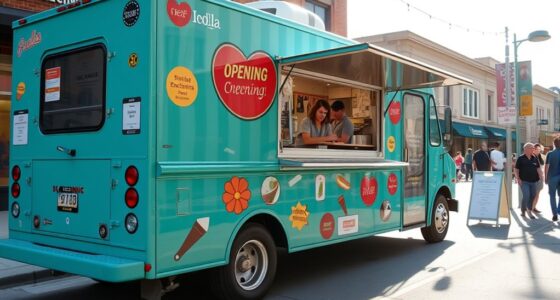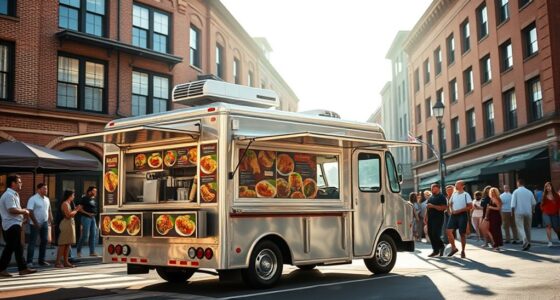To open a food truck in Billings, Montana, you’ll need permits like a Retail Food Establishment License and possibly a Temporary Use Permit, with costs ranging from $85 to over $115 for licenses plus inspection fees. Choose busy locations like downtown, markets, or events to maximize visibility. Develop a menu featuring regional flavors like bison or huckleberries, and promote through social media and community events. Keep learning how to navigate the process seamlessly and guarantee your success.
Key Takeaways
- Obtain necessary permits including Retail Food Establishment License, temporary use permits, and health inspections from Montana DPHHS.
- Budget for costs such as truck purchase or leasing, equipment, license fees, inspections, and ongoing safety and utility expenses.
- Choose high-traffic locations like downtown Billings, farmers’ markets, and community events to maximize visibility and customer flow.
- Develop a menu featuring regional Montana ingredients like bison, elk, huckleberries, and seasonal offerings to attract local customers.
- Use social media, community events, and partnerships to promote your food truck, build customer loyalty, and diversify sales channels.
Navigating Permits and Licensing Requirements
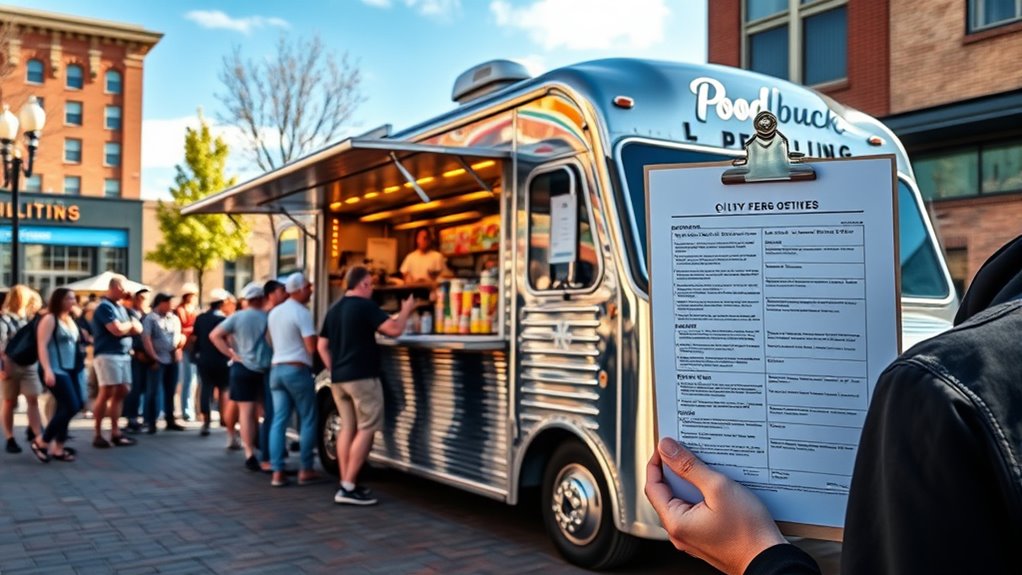
Managing permits and licensing requirements for food trucks in Billings, Montana, can seem complex, but understanding the key steps makes the process manageable. First, you’ll need a Retail Food Establishment License from the Montana Department of Health & Human Services (DPHHS). This license requires a truck inspection to ensure compliance with state regulations. Only licensed operators can run a food truck legally, and the license must be renewed annually. You’ll also need to submit an MFE Plan Review application, including your menu, floor plan, and equipment details, at least 30 days before opening. If you plan to stay in one spot over three days, a Temporary Use Permit from Billings is necessary, along with a site plan and property owner approval. Staying compliant guarantees smooth operations and avoids fines.
Understanding Food Safety and Health Regulations
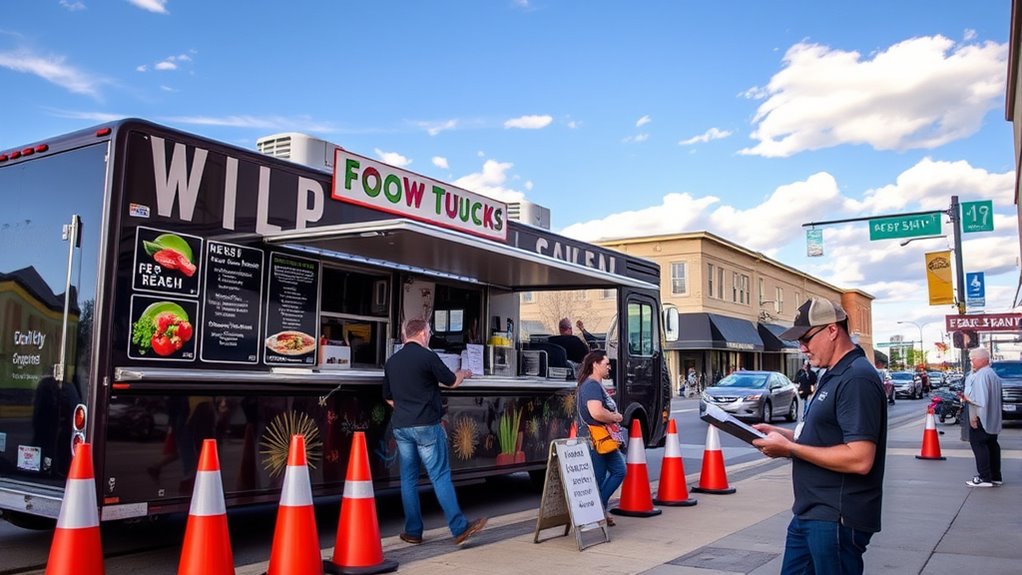
Ever wondered what it takes to keep your food truck compliant with Montana’s food safety standards? Montana follows the 2013 FDA Food Code, managed by the Department of Public Health and Human Services (DPHHS). Your truck is classified as a mobile food establishment, so it must meet regulations on food prep, storage, employee hygiene, and sanitation. Regular inspections, at least annually, guarantee compliance. Employees need to follow strict personal hygiene practices, including proper handwashing and illness reporting. You must handle time/temperature control foods carefully, maintaining proper temperatures during transport and service. Your truck needs potable water, sanitation systems, and waste disposal, plus pest control. Proper food safety procedures are essential to prevent contamination and ensure customer trust. Finally, allergen labeling is mandatory, and staff should be trained on safe handling to prevent contamination. Compliance requirements are outlined in Montana Rule for Retail Food Establishments, which provides detailed guidance on all aspects of food safety for mobile units.
Estimating Costs and Managing Fees
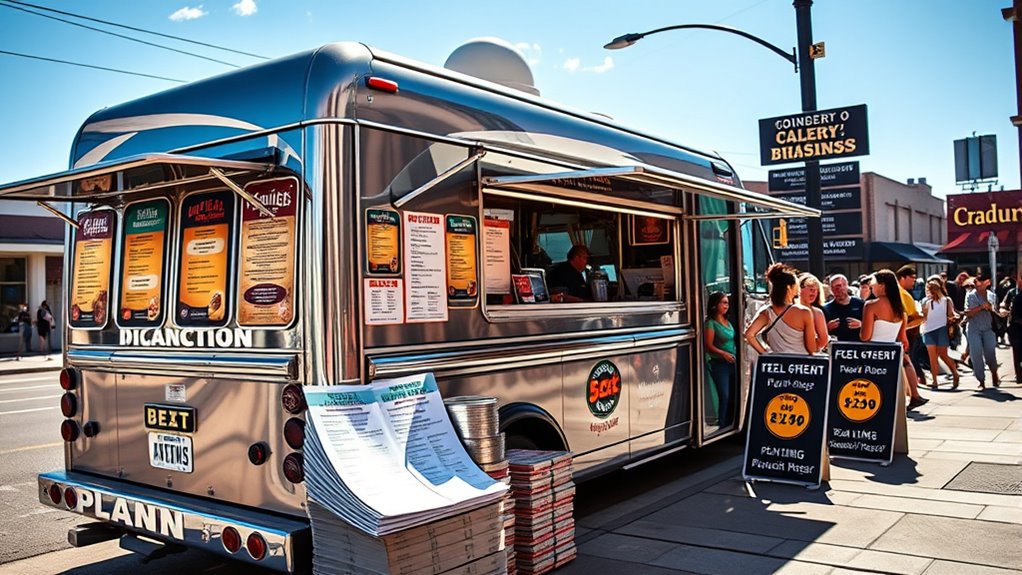
You’ll need to budget for permit application expenses and ongoing compliance costs to keep your food truck legally running in Billings. Managing fees for equipment and supplies also impacts your overall expenses, so tracking these carefully saves surprises. Being proactive with cost estimates helps guarantee your operation stays profitable and compliant. Additionally, understanding local permit and license requirements can prevent delays and unexpected charges during the startup process in Billings. Incorporating fraud prevention tools into your payment processing systems can help detect and prevent fraudulent transactions, ultimately protecting your business from financial losses.
Permit Application Expenses
Understanding the permit application expenses for a food truck in Billings is essential to budgeting effectively. Your costs include various fees for licenses, inspections, and permits. For example, the Retail Food Establishment License ranges from $85 to $115 annually, depending on staff size. Additional costs include plan review fees for mobile units, temporary use permits, and event registration fees of about $10 per event. The table below summarizes typical expenses:
| Permit Type | Cost Range | Notes |
|---|---|---|
| Retail Food License | $85–$115 | Based on employee count |
| Temporary Use Permit | Varies | Site-specific, bond up to $1650 |
| Event Registration | ~$10 per event | For special event operations |
| Inspection Fees | Variable | Propane and health inspections |
Managing these fees carefully guarantees smooth approval and compliance. Being aware of all applicable fees ensures you are financially prepared for the licensing process. Additionally, understanding the permit application process can help streamline your approval timeline and avoid unexpected costs.
Ongoing Compliance Costs
Ongoing compliance costs for a food truck in Billings include regular licensing, inspection, and safety-related expenses that must be budgeted carefully. You’ll pay annual fees for your retail food establishment license, which vary based on your menu and food handling complexity. Routine inspections happen once or twice a year, with higher-risk operations facing more frequent reviews—failure to pass can lead to fines or closures. Fire safety inspections are also mandatory, requiring maintenance of hood vents and fire extinguishing systems, with associated inspection fees. You’ll need continuous insurance coverage—liability, property, and workers’ compensation—adding to your expenses. Additionally, utility costs like propane, electricity, water, and waste disposal are ongoing. Managing these fees ensures your truck remains compliant, avoiding costly penalties and operational disruptions. Staying updated on regulatory changes is crucial to prevent unexpected fees or penalties that could impact your business’s financial health. Regularly reviewing compliance requirements can help you stay ahead of potential issues and budget accordingly.
Equipment and Supplies Budget
Estimating costs for equipment and supplies is essential to creating a realistic budget for your food truck in Billings. You’ll need to contemplate appliances like NSF-rated freezers, refrigerators, and cooking equipment, which vary in price based on new or used status. Used trucks and trailers can range from about $26,000 to $88,000, depending on condition and outfitting. Financing options with low or no down payments help manage upfront costs. Proper budgeting ensures you allocate funds effectively and avoid unexpected expenses during setup.
Choosing Prime Locations for Your Food Truck
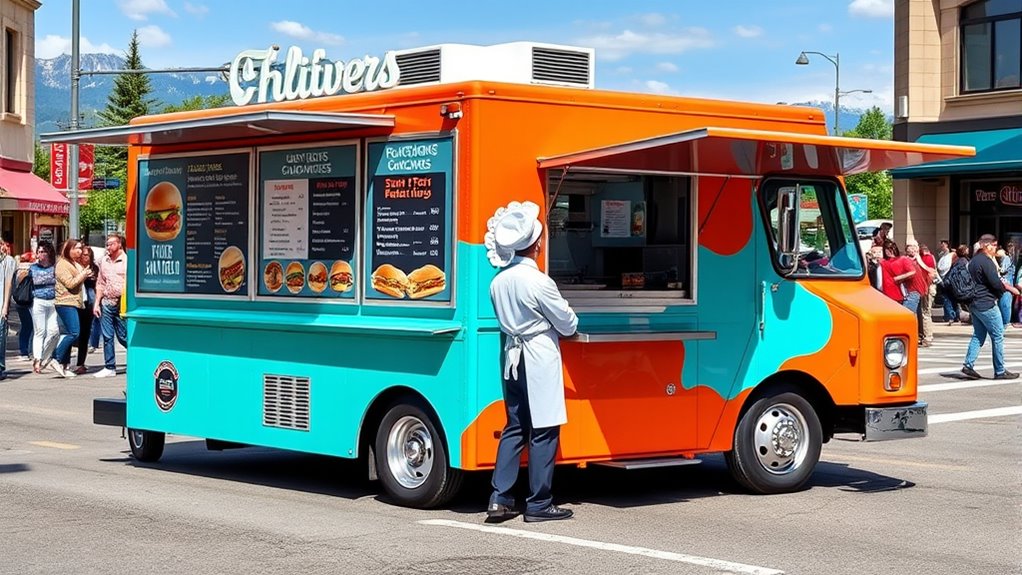
Choosing the right location for your food truck is essential to attracting steady customers and maximizing sales. You want high-traffic urban areas like downtown Billings, especially around Skypoint and First Avenue South, where foot traffic is lively due to shopping and events. Target intersections of busy streets hosting outdoor markets and street performances, such as near Rock Creek’s historic corner. Position near business districts or office clusters to catch lunchtime crowds and near public transportation hubs for commuter access. The success of community-focused initiatives like The Snack Attack demonstrates the importance of establishing a consistent presence in accessible locations. Establishing a regular spot can build trust and a loyal customer base over time. Set up at popular venues during festivals and community events to boost visibility. Partner with local markets or recurring outdoor events to attract regular customers. Collaborate with nearby coffee shops or specialty retailers to benefit from existing foot traffic. Incorporating a variety of restaurant layouts that optimize space and flow can also enhance customer experience and operational efficiency.
Curating a Menu That Appeals to Local Tastes
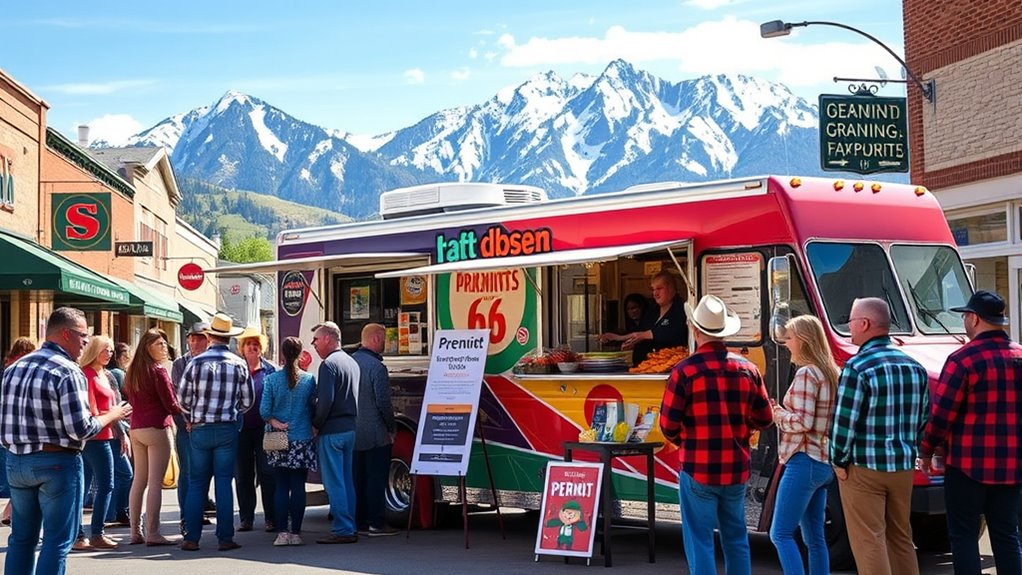
To appeal to local tastes, focus on incorporating Montana’s regional flavors and ingredients, like beef, bison, and root vegetables. Offering seasonal specials that highlight fresh, local produce can keep your menu exciting and relevant. By showcasing the stories behind your dishes, you’ll create a stronger connection with your customers and stand out in Billings. Emphasizing sustainability and authenticity as key values can also resonate with customers seeking genuine, eco-friendly options.
Incorporate Regional Flavors
Incorporating regional flavors into your food truck menu helps you connect with Montana’s rich culinary heritage and local tastes. To do this, feature game meats like bison, elk, and venison, which are lean, tender, and carry strong regional significance. Use smoked or spiced versions, like bison sausage infused with local spice blends, to evoke Montana’s rugged spirit. Incorporate native fruits such as huckleberries and Flathead cherries in sauces, desserts, and glazes to showcase local bounty. These fruits add tartness and vibrant color, making your menu distinctive. Additionally, include fish like rainbow trout, prepared simply with bold seasonings, to reflect Montana’s fishing culture. Bison Burger, a popular Montana delicacy, can be a signature offering that highlights the state’s native ingredients. Incorporating regional ingredients not only enhances authenticity but also appeals to customers seeking a taste of Montana’s unique flavors. These regional flavors create an authentic experience that resonates with locals and visitors alike.
Highlight Local Ingredients
Leveraging local ingredients is essential to creating a menu that truly resonates with Montana’s culinary identity. By sourcing from key distributors like Valley Distributing, Western Montana Growers Cooperative, and Food Services of America, you access Montana-grown produce, meats, and dairy. Incorporate regional favorites such as Montana beef, wild boar, fingerling potatoes, and local cheeses to highlight unique flavors. Using these ingredients not only emphasizes freshness but also supports the local economy and reduces environmental impact. Your menu can showcase dishes like Montana-style burgers or hearty stews, emphasizing authenticity and regional pride. Additionally, understanding advanced techniques in sourcing and menu development can give your food truck a competitive edge.
Offer Seasonal Specials
Adjusting your menu to feature seasonal specials keeps your food truck fresh and appealing to local tastes. By aligning dishes with seasonal produce, you guarantee freshness and reduce costs. Launch specials during major festivals or holidays in Billings to attract more customers. Spring and summer are perfect for limited-time offers, especially when outdoor events draw crowds. Rotating specialty dishes quarterly keeps the menu exciting and encourages repeat visits. Highlight weather-appropriate options, like hearty soups in winter or lighter fare in summer. The growing popularity of food trucks in Billings offers opportunities to experiment with innovative seasonal menus. Incorporating culinary creativity and local flavors such as smoky, spicy Mexican-inspired dishes or comfort foods with a modern twist can elevate your offerings. Offer gluten-free, vegetarian, or vegan options reflecting dietary trends. Monitor competitors’ seasonal menus to inspire innovative specials.
Effective Marketing Strategies in Billings
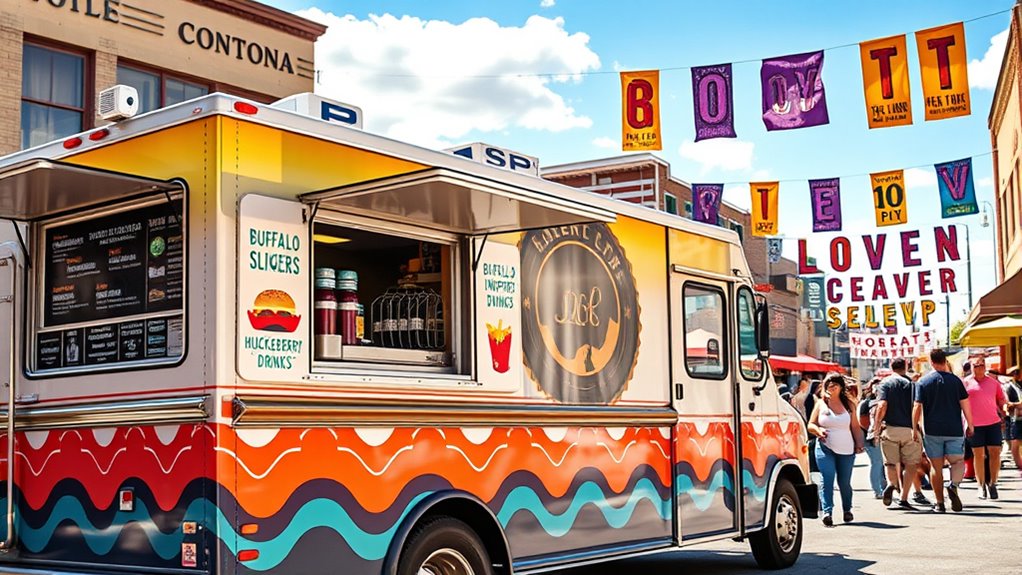
To effectively market your food truck in Billings, you need to focus on strategies that resonate with the local community and target demographics. Millennials and Gen Z, who value variety, experiences, and sustainability, are your main audience. Engage them through social media with vibrant photos, contests, and feedback prompts. Attend local events like festivals and farmers’ markets, and team up with breweries or coffee shops for cross-promotion. Utilizing food truck parks and street teams for sampling can boost visibility. Incorporating community engagement efforts can further strengthen your presence and foster lasting customer relationships.
Tips for Sustaining a Successful Food Truck Business
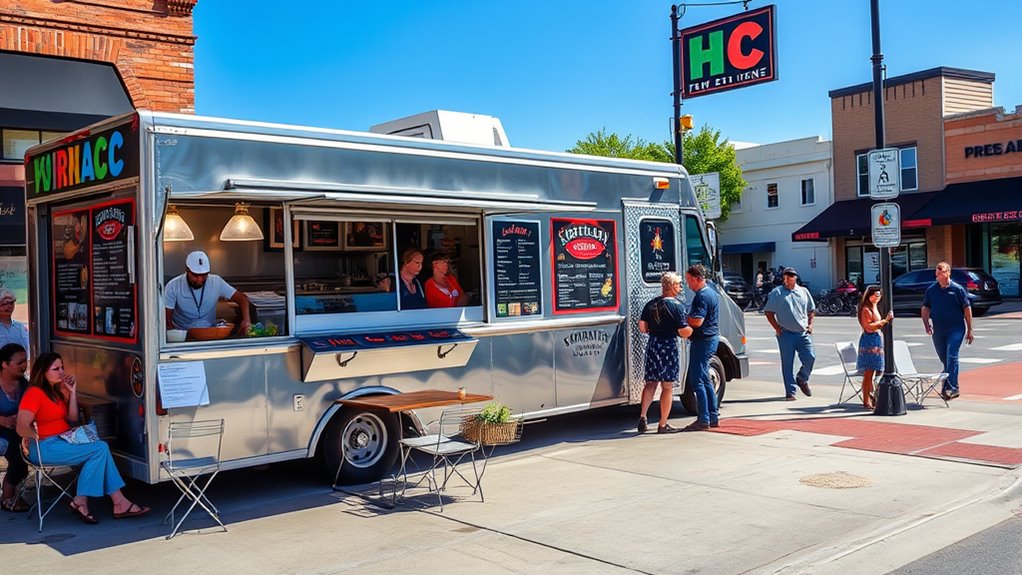
Maintaining a successful food truck business requires continuous effort beyond effective marketing. To stay competitive and profitable, focus on optimizing your operations and menu. Analyze sales data to identify top-selling, high-margin items, and reduce your menu size by 20-30% to speed service and minimize waste. Use seasonal ingredients and limited-time offers to create urgency and attract repeat customers. Diversify your sales channels with online ordering, pre-orders, and curbside pickup, making it easier for customers to buy from you. Cross-train staff to increase flexibility and reduce labor costs, while regular equipment maintenance prevents costly breakdowns. Industry growth indicates that adapting to changing market trends is vital for sustained success. Streamline staffing through demand forecasting and cross-training. Regularly update your menu with seasonal and market-driven items. Position your truck at high-traffic events and catering opportunities.
Frequently Asked Questions
What Are the Specific Zoning Restrictions for Food Trucks in Billings?
You need to follow Billings’ zoning restrictions for food trucks, which are outlined in the Unified Zoning Code. You must guarantee your truck operates in permitted zones, doesn’t block exits, sidewalks, or interfere with traffic. You also need property owner permission and a Temporary Use Permit if your truck stays in one spot over three days. Compliance with site-specific rules, parking regulations, and safety standards is essential for legal operation.
How Do I Apply for a Seasonal or Special Event Permit?
To apply for a seasonal or special event permit, you need to submit your application through the Billings Planning Division. Include all required forms, a detailed site plan, and property owner approval. For seasonal permits, reapply annually at least 30 days before expiration. For special events, submit your application at least 15 days prior to the event. Make sure all documentation is complete to avoid delays.
Are There Any Restrictions on Operating Hours for Food Trucks?
Imagine a food truck as a night owl, but Billings’ rules politely ask it to keep quiet after sunset. While there’s no strict clock, you must avoid blocking exits, traffic, or violating noise limits. Temporary permits may set hours for events or locations. In essence, your truck can be a midnight snack, but it’s wise to check local ordinances and health regulations—no one wants a midnight ban on your deliciousness!
What Insurance Requirements Are Necessary for Mobile Food Businesses?
You need to guarantee your mobile food business has the right insurance coverage to protect against risks. This includes commercial auto insurance for your truck, general liability to cover customer injuries and property damage, and business property insurance for equipment. If you have employees, workers’ compensation is essential. Also, consider coverage for food spoilage, theft, weather damage, and specialized needs like inland marine or liquor liability, depending on your menu and operations.
How Can I Find Local Partnerships for Food Truck Events or Collaborations?
To find local partnerships for food truck events or collaborations, you should actively engage with community organizations, event organizers, and local venues like ZooMontana or MetraPark. Attend networking events, join regional food truck groups online, and follow social media pages dedicated to Billings’ food scene. Reach out directly with professional proposals, showcase your menu and experience, and build relationships through consistent communication to secure recurring partnerships and event opportunities.
Conclusion
Starting a food truck in Billings is easy—if you don’t mind jumping through hoops, overspending, and praying your menu actually sells. Just remember, the real secret isn’t the permits or the location; it’s convincing people your overpriced tacos are worth the hassle. So, embrace the chaos, stay persistent, and maybe, just maybe, you’ll turn that food truck dream into a profitable reality—after all, success is just a permit away!
